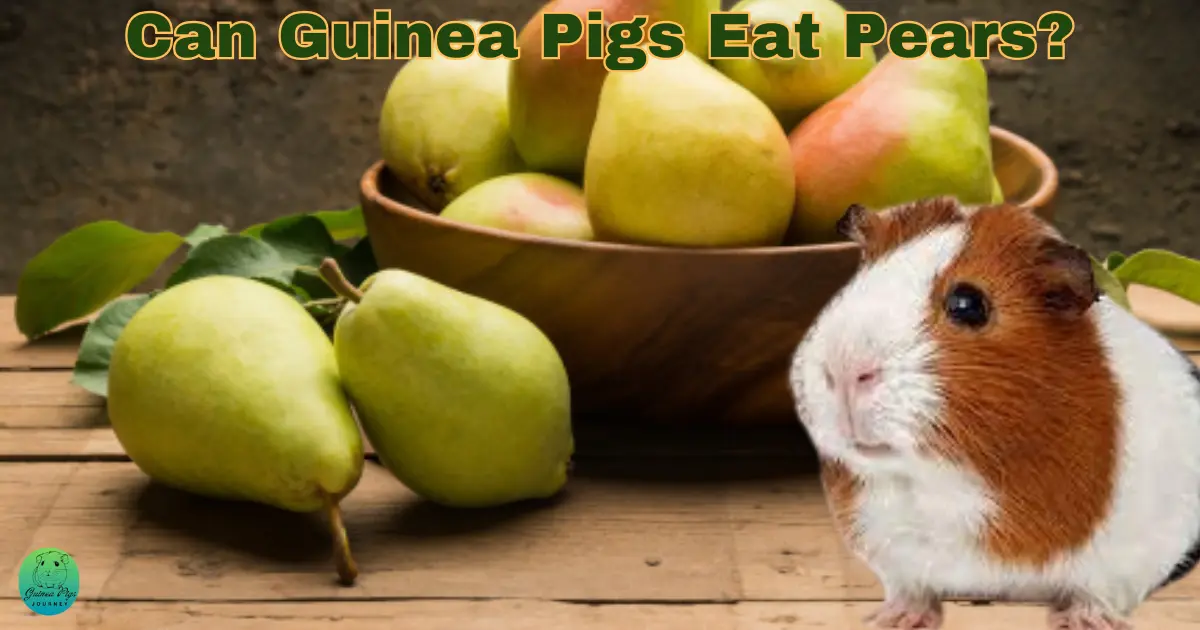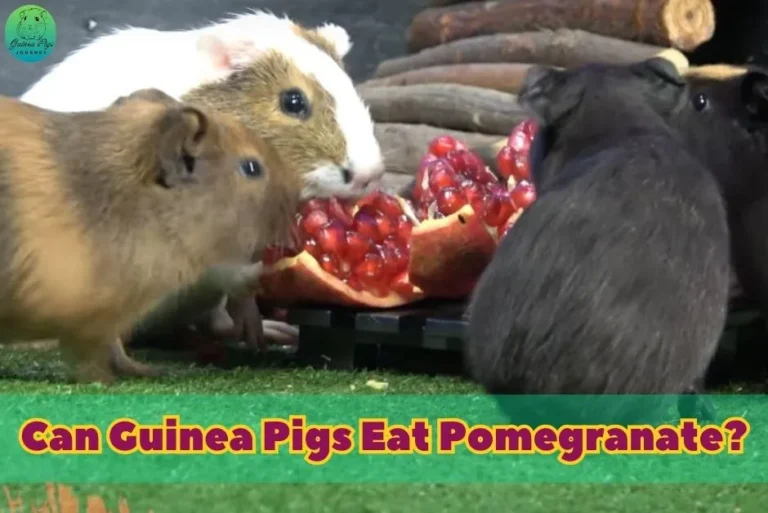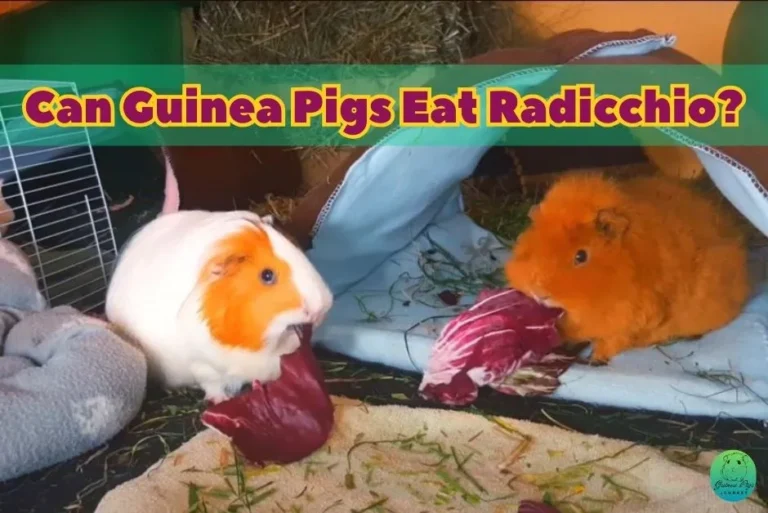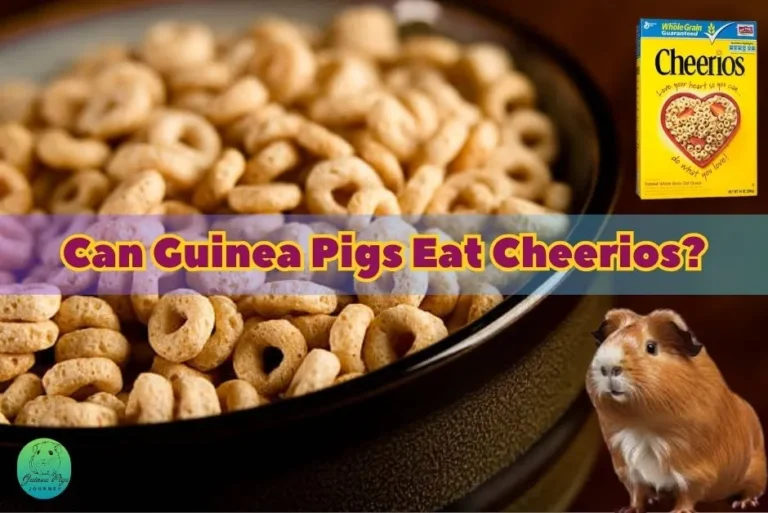Hey Guinea parents! If you are eating pears and your guinea pigs are roaming around you for some treat and cuddling. While eating pears, you must be pondering the question in your mind and thinking;
Can guinea pigs eat pears?
Yes, sure! Guinea pigs can eat pears too in moderation and gradual introduction if feeding for the first time because pears are a bit acidic and sugary. Being a caring and loving guinea pigs’ parent, you must be pondering to learn the nutritional facts and factors including the risks and benefits of pears before you decide to introduce this juicy and delicious fruit to your cavies’ diet. So, let us understand this juicy and crunchy fruit for the proper and responsible feeding and nutritional requirements of Guinea pigs.
Fun Facts – Pears: Guinea Pigs Owners:
- Pears belong to the rose family, and initially originated in Southeastern Europe as a favorite fruit of Romans and Greeks. Early developed 50 different varieties of pears by Romans.
- The first tree was planted initially in the US in about 1620.
- Today there are more than 3000 varieties of pears in the whole world.
- Pear trees are best cultivated in volcanic soil and need plenty of water if you want to grow them for you and guinea pigs as an organic product.
- Pears do not ripen while on the tree, you need to clip them off from the tree.
- Apples and Pears market revenue amounted to US$139.50bn in 2024. And it is expected to grow annually by 6.5% (CAGR 2024-2028)
- The average volume per person in the Apples and pears market is expected to amount to 6.5kg in 2024 and would be an easily available source for humans as well as pets like guinea pigs. Whereas, in global comparison, most revenue is generated in China (US$20,350m in 2024).
Nutritional Analysis of Pears for Guinea Pigs:
Pears, sweet, juicy, bell-shaped, and nutritional fruit rich in minerals, vitamins, and antioxidants help in promoting weight loss and protection from certain chronic conditions and improve the immune system in guinea pigs if fed in moderation. But if this fruit is fed excessively to guinea pigs may cause several health risks, allergies, and digestive issues that can be harmful to your cavies. To avoid these risks and get potential benefits for guinea pigs, listed below are the nutritional values and percentages per 100 grams of pear.
| Nutrients | Value per 100 grams | DV % |
| Energy | 63 kcal | |
| Carbohydrates | 15.1 grams | 5 % |
| Water | 84.1 grams | |
| Fat | 0.16 grams | 0 % |
| Protein | 0.38 grams | 1 % |
| Dietary Fiber | 3.1 gram | 11 % |
| Vitamin C, total ascorbic acid | 4.4 mg | 5 % |
| Vitamin K | 3.8 µg | 4 % |
| Folate | 6 µg | 2 % |
| Vitamin A, RAE | 1 µg | 0 % |
| Calories | 63 kcal | |
| Cholesterol | 0.00 mg | 0 % |
| Calcium, Ca | 8 mg | 1 % |
| Phosphorus, P | 10 mg | 1 % |
| Sugar | 9.69 grams | 1 % |
| Potassium, K | 87 mg | 2 % |
| Iron, Fe | 0.17 mg | 1 % |
| Magnesium, Mg | 5.7 mg | 2 % |
| Zinc, Zn | 0.21 mg | 1 % |
| Sodium, Na | 7 mg | 0 % |
| Ash | 0.3 grams | |
| Copper, Cu | 0.07 mg | 9 % |
| Niacin | 0.164 mg | 1 % |
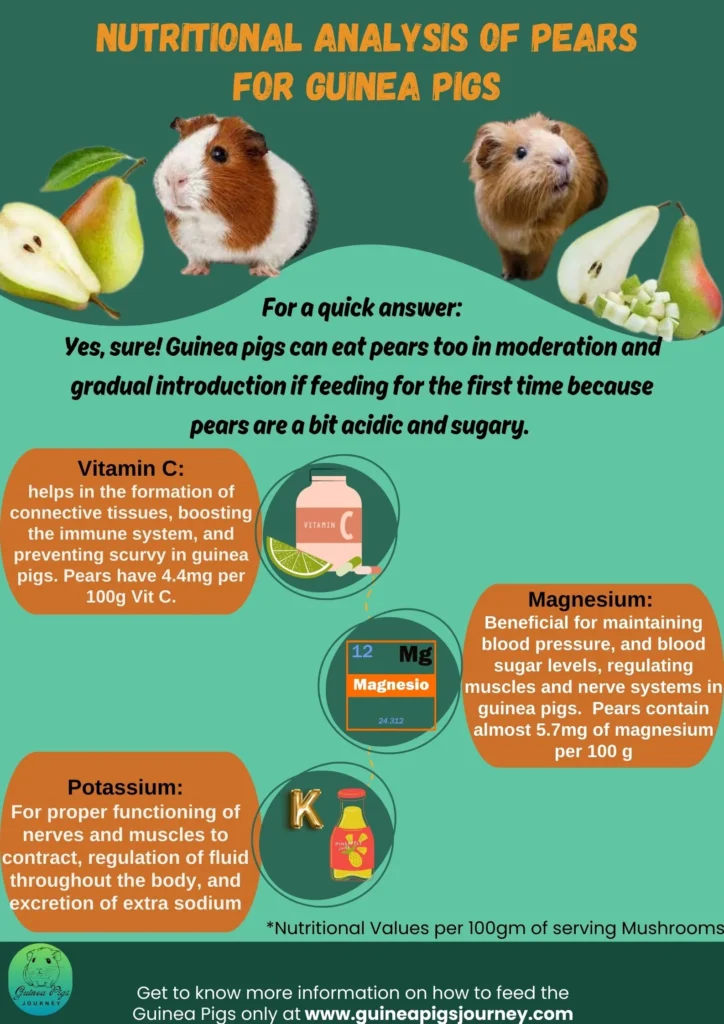
What are the Benefits of Pears to Feed Guinea Pigs?
When you feed pears to your cavies as a treat in moderation and with gradual introduction, it provides so many health and nutritional benefits to your furry friends especially when they consume potassium, calcium, phosphorus, fibers, and a good amount of Vitamin C, that they could not produce their self like humans. Here are some benefits associated with feeding pears in moderation to guinea pigs.
May Help Guinea Pigs Lose Weight: Pears are low in calories, high in water, and packed with fibers making a weight loss-friendly fruit for guinea pigs if fed in moderation.
Grow and Maintain Bone Health: Pears contain essential nutrients like Calcium and Vitamin K which are very important for the skeletal health of guinea pigs. Vit K also fights against osteoporosis, calcium absorption, bone development, and normal blood clotting in guinea pigs. Calcium also helps with the normal function of guinea pigs’ bodies and muscles including heart function.
Improve the digestive system: as a high-fiber fruit, pears treat digestion and constipation issues in guinea pigs. A specific type of fiber called pectin found in pears also helps in lowering the cholesterol level. This means eating whole pears (including the skin), helping regulate bowel movements, preventing water retention, and decreasing bloating in guinea pigs.
Support Heart Health: Pears contain a good amount of anti-oxidants, Vitamins, and fiber making pears a suitable choice for guinea pigs to support their heart system. Due to anti-oxidants presence in pears keeps the arteries of guinea pigs clear, lowers inflammation, and prevents high levels of oxidative stress. Furthermore, gradual intake of pears for guinea pigs and other white-fleshed fruits is thought to lower stroke risk.
Regulate Carbohydrates and Fats for Energy: Pears contain another nutrient called phosphorus, which is essential to regulate carbohydrates and fats in the body to consume energy in guinea pigs. Guinea pigs need to consume phosphorus from their diet to be energetic and function for body parts. It also helps to build proteins for the growth, maintenance, and repair of cells and tissues in guinea pigs.
Support nerves and muscles: Pears contain a nutrient called potassium, which is beneficial for the proper functioning of nerves and muscles to contract, regulation of fluid throughout the body, and excretion of extra sodium. Potassium helps guinea pigs to maintain the nerves and muscles in working condition while walking, eating, playing, etc.
May offer Anti-Cancer Effects: Pears contain certain important nutrients like anthocyanin and chlorogenic acid that act as anticancer properties that may protect against some cancers, including those of the lung and stomach in guinea pigs if fed in moderation.
Helps in Bladder Issues: Pears are low in calcium making them a great fruit for guinea pigs to fight bladder issues if fed in moderation.
Magnesium: Pears contain almost 5.7mg of magnesium per 100 g, which is also beneficial for maintaining blood pressure, and blood sugar levels, and regulating muscles and nerve systems in guinea pigs.
Vitamin C: Pears also contain some amount of Vit C i.e. 4.4mg per 100g, a most essential nutrient that helps in the formation of connective tissues, boosting the immune system, and prevention of scurvy in guinea pigs.
Risks of excessive feeding of pears to Guinea Pigs:
Although, pears are generally safe for guinea pigs to feed, keep an eye out for some potential risks associated with overfeeding pears to guinea pigs. Remember, moderation is the key. Some guinea pigs may be allergic, leading to digestive issues and health risks while feeding pears. Always observe your pet after introducing new foods and consult a vet if you notice any adverse reactions. Here are some factors you must know to avoid and hazardous situation.
High sugar content: As for any other fruit, pears also contain sugar which is not good for guinea pigs to intake excessively. High sugar content can lead to weight gain and obesity a common issue in guinea pigs that may even lead to diabetes. It may also lead to digestion problems and diarrhea in some pigs.
Acidity problems: Pears also contain some natural acidic properties which can be a serious concern regarding mouth sores or diarrhea in some cases. Gradual introduction is the key to feeding pears to guinea pigs. It is also advised that, if you are offering pears at one time, it is best not to offer any other fruit which contains acidic properties like grapefruits, oranges, blueberries, and tomatoes.
Allergic Reactions: Some guinea pigs may be allergic to pears, resulting in symptoms like itching, swelling, or respiratory distress. Monitor your guinea pig closely after introducing pears; consult a vet if signs of allergies emerge.
Pesticide Exposure: Pesticides on pear skin can be harmful, ingesting them may lead to toxicity. Thoroughly wash pears to remove any pesticides before serving to your guinea pig.
Choking Hazard: The seeds in pears can pose a choking hazard for guinea pigs, leading to choking while swallowing, blotting, and respiratory distress. Always remove seeds before offering pears, ensuring safe consumption.
What is the Frequency and Size of Serving Pears to Guinea Pigs?
To maintain a balanced diet, it is equally important to look for moderation when introducing any fruit including pears. However, pears may be indeed an attractive, sweet, juicy taste to guinea pigs but feeding guidelines on serving size and frequency must be kept in mind.
Frequency of feeding Pears: It is best to serve two or three slices or one-inch cubes, once or twice a week to ensure moderation and make pears an occasional treat and beneficial food for guinea pigs.
Serving Size of Pears: A suitable serving size for guinea pigs is approximately two or three slices of a pear, cut into small, bite-sized pieces.
Avoid Overfeeding: While guinea pigs enjoy treats, including pears, overfeeding can lead to digestive issues. Stick to moderation and appropriate portion sizes to prevent problems like diarrhea or upset stomach.
Can Guinea Pigs Eat All Parts Pears?
Guinea pigs can not eat all parts of pears, some of the parts are edible and some parts must be avoided to feed them to avoid any digestive issues. Let’s know what part of pears to offer to your guinea pigs.
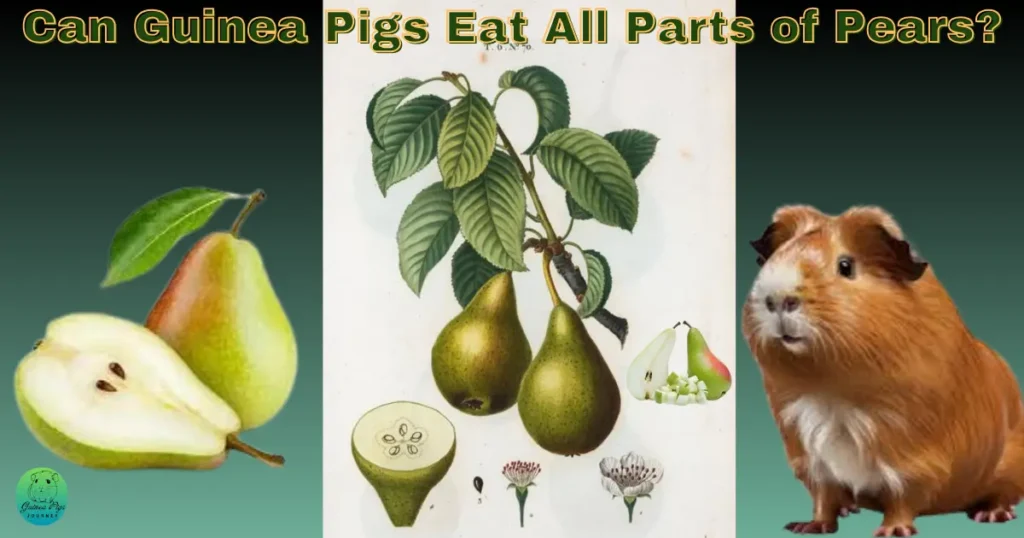
Pear Tree Leaves: Yes, Guinea pigs can eat pear leaves, there is no harm in serving them but in moderation ensure that these leaves are washed and there are no sprayed chemicals and pesticides on leaves. Before serving guinea pigs, chop the leaves and offer them as a treat as these leaves are high in calcium. Cavies can also eat the leaves of apples, bananas, and grapes.
Pear Cores: No, avoid offering cavies to the core part of the pear because it may contain pear seeds that would choke the cavies and that may be toxic for them. Sometimes, Humans also avoid or dislike eating the core part due to the irritation of seeds that can stuck into the teeth, same is the case for cavies.
Pear seeds: No, avoid serving the pear seeds to guinea pigs because they may contain some harmful cyanide elements and seeds can stuck in to small teeth of guinea pigs which can create gum or dental issues. Pear seeds are not safe for guinea pigs to feed due to choking problems.
Pear Skin: Yes, Guinea pigs can be served with the skin of a pear, there is no harm in feeding them the skin of the pear. However, the skin of the pear may be the healthier option as well for guinea pigs due to a good amount of fiber and antioxidants. Just ensure to wash them properly to remove any kind of dirt particles, pesticides, or chemicals sprayed while harvesting. If you are eating the pear and peel their skin then you may give that skin of pear to guinea pigs to feed but in moderation, limit the feeding of pear skin to one or two times a week.
Pear Tree Branches: Yes, Guinea pigs can eat the pear tree branches and wings in moderation, but ensure that these branches are washed properly and there is no pesticide or chemical on them.
Can Baby Guinea Pigs (pups) Eat Pears?
It is best to avoid feeding pears to Baby guinea pigs (Pups) because pears are such a sweet fruit at this stage for guinea pigs that would be difficult to digest them. Generally, it is advisable that fruits cannot be served to the baby guinea pigs before the age of 4-6 weeks.
You can start offering the pear to baby guinea pigs at the age of almost 4-6 weeks old. Remember, introduce the pears gradually and see the reaction of baby guinea pigs because high sugar content can upset their stomach. If you observe any change or reaction, immediately run to the veterinarian for guidance and a check-up.
How to Prepare the Pears for Guinea Pigs?
Guinea pigs love to be treated by their owners due to their love and affection with them. Being a loving and caring owner, it is also your responsibility to love and treat them in a good way. Here are some steps to prepare a treat for your cavies in the shape of pears.
Step-1: Choose / Purchase High Quality Pears: It is best recommended that, always purchase/choose high-quality, fresh, spotless, and ripe fruits including pears for your cavies to make it a healthier and loveable treat.
Step-2: Wash Pears Properly: It is best to wash the pears in running water before serving to your guinea pigs, as they may contain dirt particles, chemicals, or pesticides sprayed by store men or during harvesting on pears that can be harmful to guinea pigs.
It is recommended that, if you have your garden pears, it would be best to serve them with these natural pears.
Step-3: Remove the pear seeds and core: Always remove the seeds and core of the pear before preparing for cavies because it can be harmful for your cavies creating digestive issues and dental or gum complications for guinea pigs.
Step-4: Slice the Pears into chewable pieces: This is the part where moderation is very crucial for guinea pigs, ensure that you give the pears as a treat to limit the serving and frequency of feeding to avoid any risk. Cut the pear into small, chewable, and thin slices with the skin of the pear before serving the pear to guinea pigs to keep the treat a balanced and nutritious diet for cavies.
Step-5: Treat / Serve the Prepared Pear: To enjoy the cavies by eating the slice of pears and enjoying this treat, you can feed the cavies with your hands taking them on your lap and placing the slice of pear in a clean bowl to make it a happy treat for your furry friends.
Step-6: MUST DO THING- Clean the Leftover pear: Once your cavies are done with eating and enjoying the treat, it is the responsibility of a caring owner to remove or clean the cage or area where pears are left out. These leftover pears can make a smudge and create an unpleasant environment for cavies exposing the cavies to harmful bacteria and flies.
What Type of Pears Can Guinea Pigs Eat?
Being a responsible guinea pig parent, it is your responsibility to look after what type of things to feed or what type of things to avoid feeding lovely pets like guinea pigs. Let’s look at some of the pears that are not suitable to feed to your guinea pigs.
Prickly or Cactus Pears: Yes, Guinea pigs can eat prickly / cactus pears but make sure to peel off their skin first before feeding or preparing these pears for guinea pigs. Prickly / cactus pears also contain nutrients to boost the health of guinea pigs like maintaining cholesterol levels, blood sugar, and blood pressure levels in guinea pigs.
Frozen Pears: no, avoid feeding the frozen pears to guinea pigs, as frozen pears are teeth sensitive for guinea pigs and also create digestive issues. Although frozen fruits break the enzymes in food that can also cause loss of essential vitamins in food. It is recommended that feed them with new and fresh fruits to make a healthy diet for them.
Canned Pears: No, avoid feeding canned pears to guinea pigs, as they contain some preservatives, flavor, sugar content, syrups, etc. inside the canned food that may lead to digestive issues and stomach discomfort. Canned foods also lose their nutritional value, as canned pears would not be a viable option to feed cavies. Always offer them fresh fruits and veggies.
Dried Pears: No, avoid feeding them dried pears because pears are already rich in sugar content, if you feed them dried pears they contain more sugar which would be very harmful for guinea pigs and may lead to obesity, weight gain, and even diabetes. Only serve them with fresh options.
Cooked / Processed pears: No, avoid feeding any kind of cooked or processed food including pears to guinea pigs to save them from any kind of discomfort it is digestive or health-related, as cooked or processed pears may contain seasonings, flavors, spices, or salt in it that may cause a digestive problem in guinea pigs.
What species of pears can guinea pigs eat?
Today in the world many different species of pears are eaten by humans, but are they safe for guinea pigs or not you must know before offering them in guinea pigs’ diet.
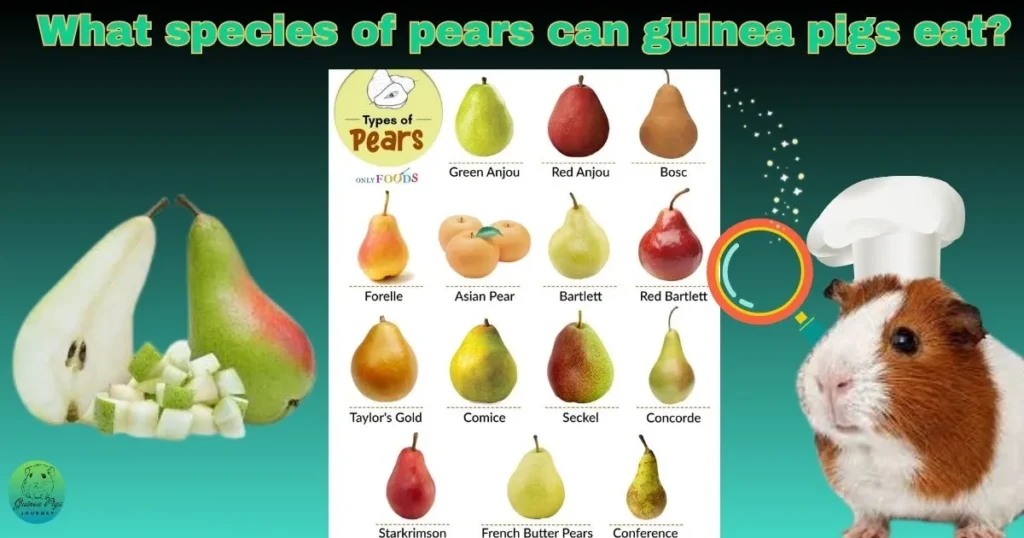
Three main varieties of pear trees are mostly grown i.e. European, Asian, and Hybrid. Some of the most common types of pears that the guinea pigs are safe to feed include;
- Bartlett (including red or green Bartlett). Bartlett pears account for about 75 percent of commercial pear production in the U.S.
- Anjou pear (including red or green Anjou)
- Bosc
- Asian (there are many different Asian pear varieties grown around the world)
- Comice
- Concorde
- Forelle
- Seckel
- Starkrimson
- Clapp
These different pears have similar health benefits, including their high fiber content, vitamin C, and antioxidants. But it is best to consult your veterinarian before introducing new food to guinea pigs’ diet.
Healthy Alternative of Pears for Guinea Pigs:
Sometimes, guinea pigs dislike or avoid eating pears due to preferences. Each guinea pig is unique, and preferences can vary. So, do not worry about it, here are some healthy alternatives that can also provide nutrients to guinea pigs if fed in moderation.
| Apples | Cranberries | Grapefruit | Plums | Blueberries |
| Kiwi fruits | Bananas | Melons (All types) | Peaches | Grapes |
| Papayas | Orange | Apricots | Nectarines | Pineapples |
| Pears | Tomatoes | Blackberries | Raspberries | Cucumbers |
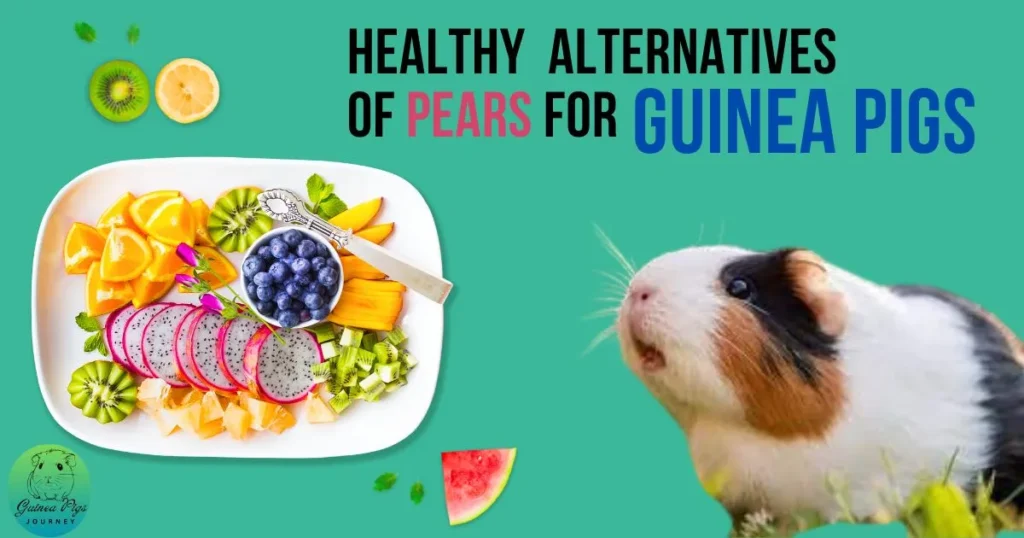
Frequently Asked Questions (FAQs):
Q: Guinea Pigs can eat pears, but do guinea pigs like pears?
Yes, of course, Guinea pigs love to eat this juicy, sweet, and rich in nutrients fruit in moderation which is very beneficial for their health. Always offer them gradually and observe their reaction and behavior.
Q: How often can I feed pears to my guinea pig?
Limit pear treats to once or twice a week to maintain a balanced diet in moderation.
Q: Are there pears that guinea pigs should avoid?
Exotic or overly ripe pears may have different nutritional profiles; stick to common varieties for guinea pigs as I have covered about the species edible by guinea pigs in moderation.
Q: What should I do if my guinea pig shows signs of allergy after eating pears?
Do not hesitate to Consult a veterinarian or professional animal behavioralist immediately for guidance and possible treatment.

